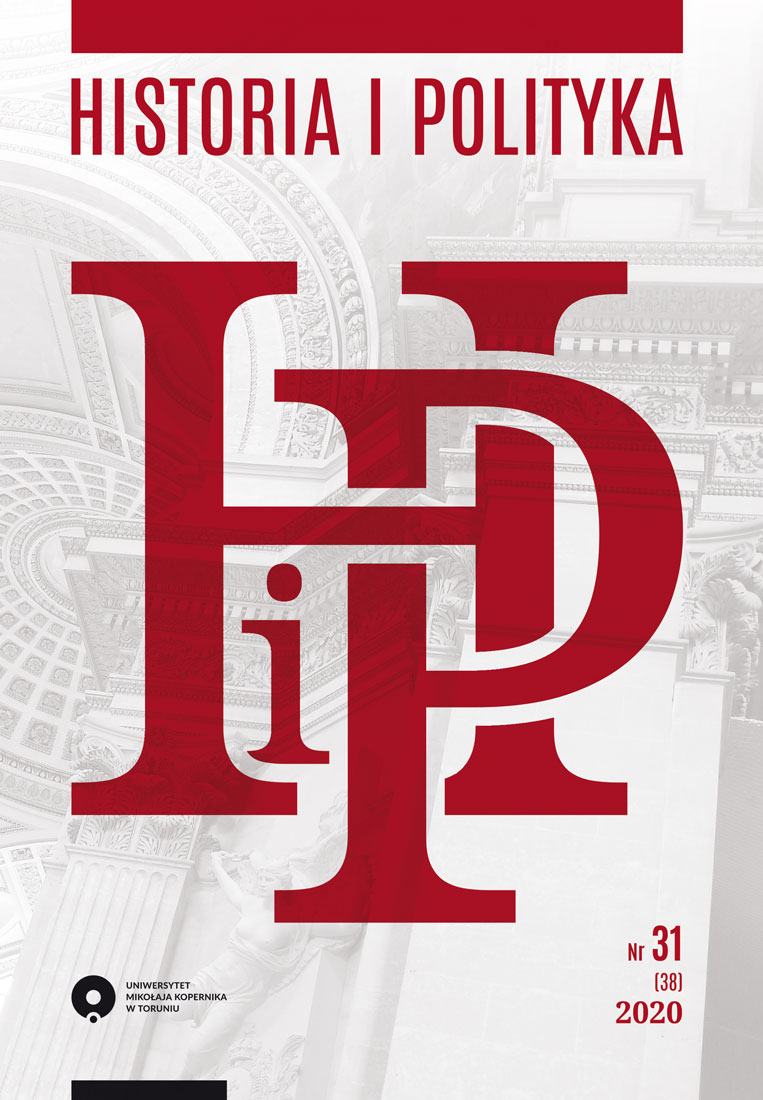Rola projektu rządowego European Union Withdrawal Act 2018 w działaniu Izby Gmin
DOI:
https://doi.org/10.12775/HiP.2020.008Słowa kluczowe
projekt rządowy European Union Withdrawal Act 2018, Partia Konserwatywna, opozycja parlamentarna, premier Theresa May, konwenanse konstytucyjneAbstrakt
This article analyzes the functioning of convention standards and rules in the behavior of the UK House of Commons. The basis for qualitative analysis was the European Union Withdrawal Act 2018 project. The solutions adopted in the British Parliament have developed differently, where the principle of parliament’s sovereignty is of fundamental importance. In the operation of the ruling party and the opposition, there are many differences regarding the possibilities of action: the legal basis and the legislative procedure of EU Withdrawal Act 2018. Violation of the legislative procedure of the governmental bill caused a violation of the rules of conduct of the state authorities. Recognizing constitutional conventions as an obligation requirement, the EU Withdrawal Act 2018 led to recognition as unconstitutional in the course of parliamentary work at the level of practice. The norms of conduct in force, constitutional conventions in a particular constitutional situation found in precedents and constitutional principles were justified in the beliefs of state authorities and recognition in a certain manner of conduct. Constitutional conventions were recognized as binding norms. The article presents reports of parliamentary committees on the meetings of the House of Commons. The ruling party and parliamentary opposition have become the subject of in-depth analysis of the material.
Bibliografia
: Feb. Parliament Looms. (2005). Pobrane z: http://news.bbc.co.uk/2/hi/uk_news/politics/vote_2005/basics/4393301.stm.
Ackerman, B. (2018) Why Britain Needs a Written Constitution and can‘t Wait for Parliament to Write One? The Political Quarterly, 59(4), 584–590.
Bidwell, S. (2004). Blaski i cienie parlamentaryzmu brytyjskiego. Warszawa: Wydawnictwo TRIO.
Biskup, B. (2012). Zarys historii politycznej Zjednoczonego Królestwa. W: B. Biskup, M. Kaczorowska (red.). System polityczny Zjednoczonego Królestwa (ss. 45–60). Warszawa: Oficyna Wydawnicza ASPRA-JR.
Brexit Amendments: What Did MPs Vote on and What Were the Results? (2019). Pobrane z: https://www.bbc.co.uk/news/uk-politics-46959545.
Drzonek, M. (1999). Znaczenie konwenansów konstytucyjnych dla ustroju Wielkiej Brytanii, Zeszyty Naukowe Uniwersytetu Szczecińskiego Acta Politica, 12(253), 133–142.
Electoral Commission. (2016). Referenda Voting. Pobrane z: https://www.electoralcommission.org.uk/england.
Herbut, R. (2002). Teoria i praktyka funkcjonowania partii politycznych. Wrocław: Wydawnictwo Uniwersytetu Wrocławskiego
Hogarth, R., White, H. (2019). Voting on Brexit. Pobrane z: https://www.instituteforgovernment.org.uk/sites/default/files/publications/voting-on-brexit-report-final.pdf.
House of Commons Exiting the European Union Committee. (2017). The Proces for Exiting The European Union and the Governmen’s Negotiatiating Objectives, First Report of Session 2016–17. Pobrane z: https://publications.parliament.uk/.
House of Commons Exiting the European Union Committee. (2019). Response to the Vote on the Withdrawal Agreement and Political Declaration: Options for Parliament Eleventh Report of Session 2017–19. Pobrane z: https://publications.parliament.uk/.
House of Commons Exiting the European Union Committee. (2019). Parliamentary Scrutiny and Approval of the Withdrawal Agreement and Negotiations on a Future Relationship, Sixth Report of Session 2017–19. Pobrane z: https://publications.parliament.uk/.
House of Commons Hansard. (2019). Votes and Proceedings, 12.03.2019. Pobrane z: https://hansard.parliament.uk/Commons/2019-03-12/division/4F5EA64F-7278-4AA4-BB58-E7FE3B3EF1A3/EuropeanUnion(Withdrawal)Act?outputType=Party.
House of Commons Hansard. (2019). Votes and Proceeding 15.01.2019. Pobrane z: https://hansard.parliament.uk/Commons/2019-01-15/division/B975E889-89F5-42D3-9C18-7562AFD1977C/EuropeanUnion(Withdrawal)Act?outputType=Party.
House of Commons Procedure Committee. (2019). Motion’s under section 13(1) of the European Union (Withdrawal) Act 2018, Eight Report of Session 2017–19. Pobrane z: https://publications.parliament.uk/.
House of Commons. (1911). Parliament Act 1911, 1949. Pobrane z: http://www.legislation.gov.uk/.
House of Commons. (2018). European Union Withdrawal Act 2018. Pobrane z: http://www.legislation.gov.uk/.
Mikuli, P. (2006). Zasada podziału władz, a ustrój brytyjski. Warszawa: Wydawnictwo Sejmowe.
Mikuli, P. (2012). Wielka Brytania. W: S. Bożyk, M. Grzybowski, (red.). Współczesne systemy państw współczesnych (ss. 9–41). Białystok: Wydawnictwo Temida 2.
Owen, J, Munro, R. (2016). Whitehall’s Preparation for the UK’s Exit. Pobrane z: https://www.instituteforgovernment.org.uk/publications/whitehall%E2%80%99s-preparation-uk%E2%80%99s-exit-eu.
Paun, A., Hazell, R. (2010). Hung Parliaments and the Challenges for Westminster and Whitehall: How to Make Minority and Multiparty Governance Work. The Political Quarterly, 81(2), 213–227. DOI: 10.1111/j.1467-923X.2010.02082.x.
Silk, P. (1994). Jak działa parlament brytyjski?. Warszawa: Wydawnictwo Sejmowe.
Theresa May Urges Jeremy Corbyn: Let’s Talk Brexit. Pobrane z: https://www.bbc.com/news/uk-politics-46901217.
Wieciech, T. (2010). Konwenanse konstytucyjne w orzecznictwie sądowym obszaru common law. Państwo i Prawo, 9(775), 83–92.
Wieciech, T. (2011). Konwenanse Konstytucyjne. Kraków: Wydawnictwo Uniwersytetu Jagiellońskiego.
Wieciech, T. (2016). Krytyka prawa i prawników w angielskiej myśli politycznej doby siedemnastowiecznych wojen domowych i rewolucji. W: R. Kłosowicz i in., Konstytucjonalizm doktryny, partie polityczne. Księga dedykowana Profesorowi Andrzejowi Ziębie (ss. 731–741). Kraków: Wydawnictwo Uniwersytetu Jagiellońskiego.
Wieciech, T. (2005). Rola konwenansów konstytucyjnych w konstytucjonalizmie brytyjskim. Politeja, 2(4), 317–337.
Zięba, A. (1994). Parlament Wielkiej Brytanii. Warszawa: Wydawnictwo Sejmowe.
Zięba, A., Wieciech, T. (2014). Parlament Zjednoczonego Królestwa Wielkiej Brytanii i Irlandii Północnej. Warszawa: Wydawnictwo Sejmowe.
Pobrania
Opublikowane
Jak cytować
Numer
Dział
Licencja
Uniwersytet Mikołaja Kopernika w Toruniu respektuje prawo do prywatności i ochrony danych osobowych autorów.
Dane autorów nie są wykorzystywane w celach handlowych i marketingowych. Redaktorzy i recenzenci są zobowiązani do zachowania w poufności wszelkich informacji związanych ze złożonymi do redakcji tekstami.
Autor, zgłaszając swój tekst wyraża zgodę na wszystkie warunki i zapisy umowy licencyjnej (określającej prawa autorskie) z Uniwersytetem Mikołaja Kopernika w Toruniu.
Statystyki
Liczba wyświetleń i pobrań: 191
Liczba cytowań: 0



